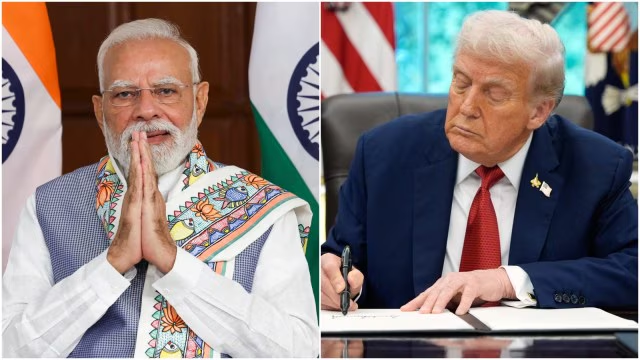The Gaza Gambit: Modi’s Masterstroke of Praise for Trump Aims to Unlock a Partnership Stalled by Tariffs

Image via The Indian Express
NEW DELHI – The relationship between India and the United States under its current leadership has become a study in contrasts: a deep, almost fraternal embrace on matters of global security, yet a constant, grinding friction on the battlefield of trade. On Tuesday, Prime Minister Narendra Modi made a decisive move to break this impasse, executing a diplomatic gambit of remarkable skill. He offered a full-throated, public endorsement of President Donald Trump’s ambitious new peace plan for Gaza.
This gesture of praise, coming precisely at a time when trade negotiators from both nations are locked in tense tariff disputes, is far more than a simple congratulatory note. It is a masterstroke of strategic communication, a clear signal from New Delhi that the shared geopolitical interests of the world’s two largest democracies must not be held hostage by disagreements over apples and steel. It is a bold move designed to leverage the power of personal diplomacy to unstick a vital partnership and reinforce India’s role as a pivotal player in global peace.
The Trump Plan: A ‘Marshall Plan’ for Gaza
President Trump’s “Gaza Prosperity and Security Initiative,” unveiled last week, is characteristically bold and transactional. It eschews the frameworks of past negotiations in favor of a grand bargain heavily reliant on economic incentives and the backing of major Arab powers. The core of the plan is a monumental reconstruction fund—a veritable “Marshall Plan” for Gaza—bankrolled by the US, Saudi Arabia, and the UAE. This fund would finance tangible projects: a new deep-water port, high-tech industrial parks, and modern energy infrastructure, aimed at creating a viable, self-sustaining economy.
However, this prosperity comes with a hard-edged, non-negotiable condition: the complete and verifiable disarmament of Hamas and all other militant factions, with governance handed over to a reformed Palestinian Authority backed by an inter-Arab security force.
It was this security-first, development-focused model that Prime Minister Modi singled out for praise. His office released a statement describing the initiative as a “visionary roadmap that balances the aspirations of the Palestinian people with the absolute necessity of a terror-free environment.” The statement continued, “India commends President Trump for this bold and pragmatic approach. We believe it has the potential to create a new paradigm for peace and stability in a region that is critical to the entire world.”
A Bridge Over Troubled Waters of Trade
This warm endorsement stands in stark contrast to the chilly atmosphere of the ongoing trade talks. For months, the relationship has been defined by a quiet “war of attrition” over tariffs. The Trump administration, in its drive to reduce trade deficits, has been targeting what it calls India’s “unfairly high” duties on American agricultural products, medical equipment, and iconic brands like Harley-Davidson. In response, India has defended its “Make in India” policy, using tariffs to build its domestic manufacturing base and insisting on equitable market access for its own goods and services.
This deadlock, while not a full-blown trade war, has created a persistent friction that has stalled progress in other areas. Mr. Modi’s praise for the Gaza plan is a calculated move to rise above this friction, demonstrating that India’s strategic vision is not confined to the ledger books of import-export data.
The Geopolitical Stakes for India
For India, a peaceful and stable Middle East is not a distant foreign policy goal; it is a core national interest. The region is the primary source of India’s immense energy needs. It is home to a diaspora of over nine million Indians whose safety and well-being are a top priority and who send back tens of billions of dollars in remittances annually.
Furthermore, a lasting peace is the key to unlocking the full potential of the ambitious India-Middle East-Europe Economic Corridor (IMEC), a project envisioned as a modern-day Spice Route that is currently hampered by regional instability. By endorsing a plan that could stabilize Gaza, Mr. Modi is also making a strategic investment in one of his own flagship geopolitical initiatives.
The Modi-Trump Rapport: A Meeting of Minds
At the heart of this gambit is the proven personal chemistry between Prime Minister Modi and President Trump. Their relationship has long been built on a foundation of mutual respect for each other as strong, nationalist leaders who have disrupted their respective political establishments. They share a preference for bold, decisive action and personal deal-making over bureaucratic process. Mr. Modi’s gesture is tailored to resonate with a leader who is known to appreciate loyalty and public support. It is a strategic deposit into a bank of personal goodwill, intended to yield dividends across the entire spectrum of the US-India relationship.
In conclusion, this is more than just praise. It is the articulation of the Modi Doctrine in its clearest form: a pragmatic, multi-vectored foreign policy that refuses to let disagreements in one area derail progress in another. It is a confident assertion that India will act as a “leading power,” proactively supporting initiatives that foster global stability. The Gaza gambit has been played. It is a calculated risk, but one that could potentially reset the terms of engagement with a crucial partner and pave the way for a more collaborative future.